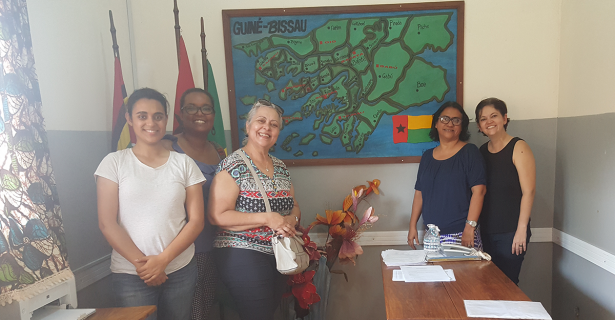Can grassroots initiatives foster innovation in Guinea Bissau? This is a question I came up with last summer while spending time in Guinea-Bissau, a small nation in West Africa, for my capstone research and a consultancy project. This summer, I have been working with a grassroots organization based in the country to try and answer it. The organization is called Missão Evangélica Batista Renovada, or MEBAR. It is a faith-based organization that has a number of social projects and two low-cost private schools in a small community in the rural area around the capital, Bissau. It addresses issues from HIV prevention to solar power and clean water.
MEBAR is about to build a community center on the country’s main commercial route, and my role is to assist them in making it more than an aid take-away service, to make it a center to foster innovation. The organization, founded by my fellow Brazilian nationals, is all about empowering women, children and men to accomplish their objectives. That is why I decided to come back and work with them for a second summer. I want to use the knowledge I gained from my Fletcher degree so far, combined with my ten-year career in education, to set MEBAR up to set Guinea-Bissauans up for success. In exchange, they have been teaching me about the challenges of working in the fifth poorest country in the world and why they are absolutely passionate about it.
There are four stages of the project, and we are approaching the end of the first stage. We have connected with the Tufts alumnus that runs the UNDP office in the country and received some guidance about what is most pressing for Guinea-Bissauans to improve their economic and human prospects. We have also been working on the management planning and the visual identity for what is being called the Vida Innovation Center. In the meantime, negotiations proceed to acquire public funding for the land on which the center will be built. In the middle of the pandemic, a country like Guinea-Bissau becomes even more challenging to do this work. Eighty percent of the country’s budget is foreign aid-based, while at least another ten percent is derived from exports – mainly cashew nuts and fish. After the lockdown, people have not been able to go fishing or to sell any produce at the local markets. Literacy levels are low, internet access is very expensive and access to health services is limited – either by distance, cost or availability. HIV infection levels are high, which leaves a significant part of the population in the high-risk group for death from COVID-19. Female-mutilation and child marriage, although prohibited by law, are common practices in rural areas. The country is still recovering from the devastation wrought by a nine-year independence war with Portugal, that ended in 1974, and a civil war fought in the late-1990s.
I was motivated to work with Guinea-Bissauans and use the tools I have been equipped with as a means to change the lives of young women and men.
The Vida Innovation Center will offer professional courses, women’s literacy classes, and a computer lab with internet connectivity where young students will be encouraged to explore the world. While our team of four work remotely from Boston, Brazil, Portugal, and Guinea-Bissau, we have been brainstorming how we can make sure that the center is not yet another community center, offering services in a catering mode. We have been discussing how this center can be a place where young people can come up with solutions to improve their lives and their nation. We want to offer the resources, tools, and support they need to make things happen.
Can an innovation center change the lives of girls and boys? Can these girls and boys be in positions of power and influence in the future? Can these boys and girls change Guinea-Bissau? Obviously, I am of the opinion that it can be done, even if we do not have a perfect formula for it. And we are definitely open to input; please share your ideas by emailing: Marcia.Mendes@tufts.edu.

